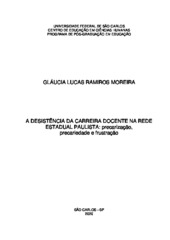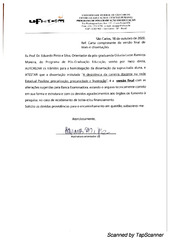| dc.contributor.author | Moreira, Gláucia Lucas Ramiros | |
| dc.date.accessioned | 2020-10-25T09:53:39Z | |
| dc.date.available | 2020-10-25T09:53:39Z | |
| dc.date.issued | 2020-08-25 | |
| dc.identifier.citation | MOREIRA, Gláucia Lucas Ramiros. A desistência da carreira docente na rede Estadual Paulista: precarização, precariedade e frustração. 2020. Dissertação (Mestrado em Educação) – Universidade Federal de São Carlos, São Carlos, 2020. Disponível em: https://repositorio.ufscar.br/handle/ufscar/13366. | * |
| dc.identifier.uri | https://repositorio.ufscar.br/handle/ufscar/13366 | |
| dc.description.abstract | The goal of this research is to identify the reasons which lead public teachers from the 2010 and 2013 tenures of the State of São Paulo to resign from their positions and give up their teaching career altogether. Based on previous research and preliminary and sequential inquiries on the subject, this work’s hypothesis is that teachers were released from their positions due to various elements related to: precarious infrastructure and work conditions; the predominance of a productivist perspective; and to the pervasive managerial logic in the school context. According to the assumptions and procedures of qualitative research, documentary data were collected and eight individual semi-structured interviews were conducted with teachers who were exonerated from their positions in the São Paulo state network. The data obtained in the interviews, along with documentary data, were systematized, categorized and interpreted with the use of “content analysis” by Bardin (1979), which provided a joint and contextualized analysis. As a result, the main factors influencing the dismissal at the request of teachers were identified, namely: the education system, the school (dis)organization and the daily work environment, permeated by tensions, conflicts, violence and indiscipline situations, as well as by, often averse, managerial practices to teaching identity and pedagogical expectations; the process of precarious work and the situation of objective precariousness; the subjective precariousness and the feelings derived from it; and the fact that teachers felt ill because of their work. Considering the content of the interviews, it was found that, despite remuneration being an important factor, the frustration and negative feelings resulting from the lack of recognition and strangeness towards work, as well as the lack of prestige and the “precariation-precariousness” duo, had a strong influence on teacher’s decision to resign. | eng |
| dc.description.sponsorship | Não recebi financiamento | por |
| dc.language.iso | por | por |
| dc.publisher | Universidade Federal de São Carlos | por |
| dc.rights | Attribution-NonCommercial-NoDerivs 3.0 Brazil | * |
| dc.rights.uri | http://creativecommons.org/licenses/by-nc-nd/3.0/br/ | * |
| dc.subject | Trabalho do professor | por |
| dc.subject | Gerencialismo | por |
| dc.subject | Precarização | por |
| dc.subject | Precariedades | por |
| dc.subject | Exoneração docente | por |
| dc.subject | Teachers work | eng |
| dc.subject | Managerialism | eng |
| dc.subject | Precariation | eng |
| dc.subject | Precariousness | eng |
| dc.subject | Teacher exoneration | eng |
| dc.title | A desistência da carreira docente na rede Estadual Paulista: precarização, precariedade e frustração | por |
| dc.title.alternative | Quitting teaching career in São Paulo State education network: precariation, precariousness and frustration | eng |
| dc.type | Dissertação | por |
| dc.contributor.advisor1 | Silva, Eduardo Pinto e | |
| dc.contributor.advisor1Lattes | http://lattes.cnpq.br/3492708361349827 | por |
| dc.description.resumo | Esta pesquisa objetivou identificar os motivos que levaram os docentes nomeados a partir dos concursos de 2010 e 2013 no Estado de São Paulo a se exonerar do cargo e a desistir da carreira docente nesta esfera. Considerou-se, com base em pesquisas anteriores e problematizações preliminares e sequenciais, a hipótese de que os professores se exoneram do cargo em razão de diversos elementos relacionados à precarização do trabalho, à precariedade da infraestrutura e das condições de trabalho, à perspectiva produtivista e à lógica gerencialista no contexto escolar. De acordo com pressupostos e procedimentos da pesquisa qualitativa, foram coletados dados documentais e realizadas oito entrevistas individuais semiestruturadas com professores que se exoneraram do cargo efetivo na rede estadual paulista. Os dados obtidos nas entrevistas foram sistematizados, categorizados e interpretados de acordo com a proposta de “análise de conteúdo” de Bardin (1979), o que propiciou uma análise conjunta e contextualizada dessas e dos dados documentais. Como resultado, identificaram-se os principais fatores que influenciaram a exoneração a pedido dos professores, a saber: o sistema de ensino, a (des)organização escolar e o cotidiano e ambiente de trabalho, pautados por tensões, conflitos, situações de violência e indisciplina, assim como por práticas gerencialistas não raro avessas à identidade docente e às expectativas pedagógicas; ao processo de precarização do trabalho e à situação de precariedade objetiva; à precariedade subjetiva e aos sentimentos dela derivados; e ao fato de se sentirem doentes em razão do trabalho. Considerando-se a fala dos entrevistados, constatou-se que, apesar de a remuneração ser um fator importante, a frustração e os sentimentos negativos resultantes da falta de reconhecimento e de estranhamento com o trabalho, assim como o desprestígio e o par precarização-precariedades, tiveram forte influência na decisão de se exonerar. | por |
| dc.publisher.initials | UFSCar | por |
| dc.publisher.program | Programa de Pós-Graduação em Educação - PPGE | por |
| dc.subject.cnpq | CIENCIAS HUMANAS::EDUCACAO | por |
| dc.publisher.address | Câmpus São Carlos | por |
| dc.contributor.authorlattes | http://lattes.cnpq.br/9750472863840276 | por |


